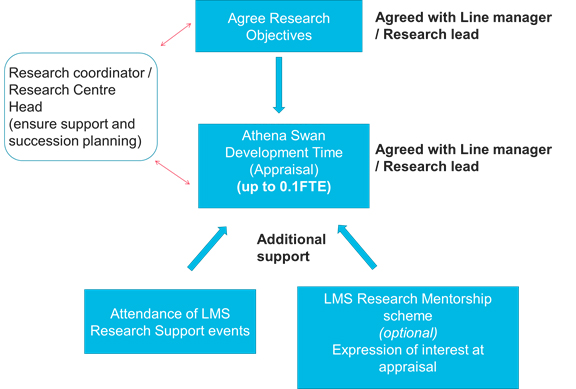Equality, diversity and inclusion in the School of Life and Medical Sciences
 There are long standing disparities in how people experience Higher Education. Life and Medical Sciences is firmly committed to narrowing this gap in educational and career outcomes that affects our community identifying with certain gender identities. We are proud that through an ongoing process of engaging with staff and students, and collaboratively developing and assessing the impact of a suite of actions, this effort has been recognised in an Athena Swan Silver Award in summer 2023. The Athena Swan Charter aims to help both High Education Institutions as well as the areas that comprise them to evaluate the structures, policies, processes, and practices that support genderb-ased equity.
There are long standing disparities in how people experience Higher Education. Life and Medical Sciences is firmly committed to narrowing this gap in educational and career outcomes that affects our community identifying with certain gender identities. We are proud that through an ongoing process of engaging with staff and students, and collaboratively developing and assessing the impact of a suite of actions, this effort has been recognised in an Athena Swan Silver Award in summer 2023. The Athena Swan Charter aims to help both High Education Institutions as well as the areas that comprise them to evaluate the structures, policies, processes, and practices that support genderb-ased equity.
Meet some of our role models
Dr Lisa Lione is a Senior Lecturer in Neuropharmacology at the University in the School of Life and Medical Science, having gained her PhD at the University of Bristol in 1997. Lisa is a fellow of the HEA, a member of the ethical review committee and holds a Home Office project licence managing basic research on diabetes mechanisms and treatments. Lisa has secured QR and HHSRI research enrichment grant funding and recently managed a consultancy study with the CRO Transpharmation (TP) Ltd. This collaborative research has led to a joint QR/TP Ltd funded collaborative PhD studentship application (£50,000 investment from TP Ltd) to validate a new transcriptomic approach to identify biomarkers of neuropathic pain and improve responder rates to analgesia in diabetes.
Prior to joining Herts in 2008, Lisa was employed in industry for over 10 years in drug discovery research at Parke Davis, GSK and co-founded a privately held biotechnological company, Cambridge Biotechnology Ltd (now part of Proximagen). In industry, Lisa directed in vivo neuroscience research and provided decision making data to deliver a candidate molecule into preclinical development for diabetic neuropathy (now in phase II) along with securing further funding from venture capital investors.
Lisa is author/co-author of 18 full scientific papers, reviews, books chapters and patents across a range of neurobiological subjects. The basic theme of Lisa’s research is to the improve the predictive validity of models of disease focusing on translatable markers and naturalistic behaviours, and to investigate mechanisms underlying functional changes in diabetes and ketamine /novel psychoactive substance induced bladder toxicity. The latter project is a PhD project in collaboration with Department of Pharmacy (Prof Schifano, Dr Fergus, and Dr Stair) and St George’s Hospital (Dr Colin Davidson). Lisa’s collaborative research focus is developing at Herts by combining her specialised in vivo skills with industry experience in drug discovery and translational science.
Motto: The important thing is not to stop questioning.
Shori Thakur studied Pharmacology at the University of Hertfordshire between 1996 and 2000 and subsequently went on to complete a PhD in Molecular Pharmacology, investigating the transcriptional regulation of cationic amino acid transporters in cultured vascular smooth muscle cells. This was followed by a three year GlaxoSmithKline-funded postdoctoral fellowship that focused her research on identifying transport mechanisms that mediate entry of highly selective inhibitors of the inducible nitric oxide synthase enzyme into cells.
She took up her position as a Senior Lecturer in Pharmacology in 2007 and has continued her research on nitric oxide, successfully supervising PhD and Masters students. She currently leads a team of nine researchers studying for PhDs or Masters Degrees. She is also the Research Tutor and Research Degrees Admissions Tutor for the Department of Human and Environmental Sciences and contributes to teaching and other administrative duties.
How we support women in science
The School of Life and Medical Sciences first achieved the Athena SWAN Bronze award in November 2014. View our School Athena SWAN Bronze submission (PDF - 2.55 Mb).
The Charter recognises good practice in recruiting, retaining and promoting women. It covers women in academic and research roles, but also progression of students into academia.
Athena SWAN has given us the opportunity to reflect on existing practices and prevailing cultures, acknowledge and celebrate current good practice and identify areas for improvement.
We also contribute to improving the profile of female careers in STEMM by submitting academic career profiles of colleagues from within the School of Life and Medical Science to the Academic Case Studies section of jobs.ac.uk.
Case studies on how policies and practices within the School and University support staff success in the sciences.
Support for staff case studies
News
See a list of Athena SWAN news from the University of Hertfordshire
Any questions?
Contact Dr Shivani Sharma using this email if you have queries about Athena SWAN in the School of Life and Medical Sciences.


